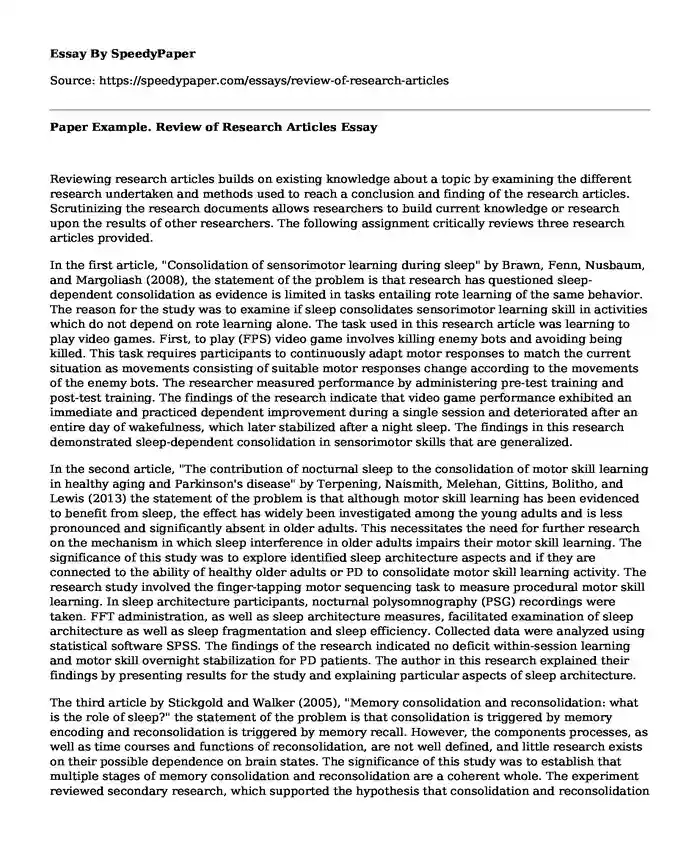Reviewing research articles builds on existing knowledge about a topic by examining the different research undertaken and methods used to reach a conclusion and finding of the research articles. Scrutinizing the research documents allows researchers to build current knowledge or research upon the results of other researchers. The following assignment critically reviews three research articles provided.
In the first article, "Consolidation of sensorimotor learning during sleep" by Brawn, Fenn, Nusbaum, and Margoliash (2008), the statement of the problem is that research has questioned sleep-dependent consolidation as evidence is limited in tasks entailing rote learning of the same behavior. The reason for the study was to examine if sleep consolidates sensorimotor learning skill in activities which do not depend on rote learning alone. The task used in this research article was learning to play video games. First, to play (FPS) video game involves killing enemy bots and avoiding being killed. This task requires participants to continuously adapt motor responses to match the current situation as movements consisting of suitable motor responses change according to the movements of the enemy bots. The researcher measured performance by administering pre-test training and post-test training. The findings of the research indicate that video game performance exhibited an immediate and practiced dependent improvement during a single session and deteriorated after an entire day of wakefulness, which later stabilized after a night sleep. The findings in this research demonstrated sleep-dependent consolidation in sensorimotor skills that are generalized.
In the second article, "The contribution of nocturnal sleep to the consolidation of motor skill learning in healthy aging and Parkinson's disease" by Terpening, Naismith, Melehan, Gittins, Bolitho, and Lewis (2013) the statement of the problem is that although motor skill learning has been evidenced to benefit from sleep, the effect has widely been investigated among the young adults and is less pronounced and significantly absent in older adults. This necessitates the need for further research on the mechanism in which sleep interference in older adults impairs their motor skill learning. The significance of this study was to explore identified sleep architecture aspects and if they are connected to the ability of healthy older adults or PD to consolidate motor skill learning activity. The research study involved the finger-tapping motor sequencing task to measure procedural motor skill learning. In sleep architecture participants, nocturnal polysomnography (PSG) recordings were taken. FFT administration, as well as sleep architecture measures, facilitated examination of sleep architecture as well as sleep fragmentation and sleep efficiency. Collected data were analyzed using statistical software SPSS. The findings of the research indicated no deficit within-session learning and motor skill overnight stabilization for PD patients. The author in this research explained their findings by presenting results for the study and explaining particular aspects of sleep architecture.
The third article by Stickgold and Walker (2005), "Memory consolidation and reconsolidation: what is the role of sleep?" the statement of the problem is that consolidation is triggered by memory encoding and reconsolidation is triggered by memory recall. However, the components processes, as well as time courses and functions of reconsolidation, are not well defined, and little research exists on their possible dependence on brain states. The significance of this study was to establish that multiple stages of memory consolidation and reconsolidation are a coherent whole. The experiment reviewed secondary research, which supported the hypothesis that consolidation and reconsolidation are a cohesive whole. The finding of the study suggests that consolidation and reconsolidation are components of a complex system of memory processing, and many of this processes entail sleep as either obligatory or permissive.
The similarity in the three articles is that they all focus on the topic of sleep in the consolidation of skill learning. However, whereas the first and second article follows an experimental research approach, the third article reviews secondary literature in research. In my view, sleep plays a vital role in the consolidation of motor skill learning. Memory consolidation and reconsolidation are a complete set and seem to be dependent on time and brain state processes that are impacted by sleep states.
References
Brawn, T. P., Fenn, K. M., Nusbaum, H. C., & Margoliash, D. (2008). Consolidation of sensorimotor learning during sleep. Learning & Memory, 15(11), 815-819.
Stickgold, R., & Walker, M. P. (2005). Memory consolidation and reconsolidation: what is the role of sleep?. Trends in neurosciences, 28(8), 408-415.
Terpening, Z., Naismith, S., Melehan, K., Gittins, C., Bolitho, S., & Lewis, S. J. (2013). The contribution of nocturnal sleep to the consolidation of motor skill learning in healthy aging and Parkinson's disease. Journal of sleep research, 22(4), 398-405.
Cite this page
Paper Example. Review of Research Articles. (2023, Mar 15). Retrieved from https://speedypaper.net/essays/review-of-research-articles
Request Removal
If you are the original author of this essay and no longer wish to have it published on the SpeedyPaper website, please click below to request its removal:
- History of Republicanism - Free Essay Example
- Essay Sample with Publicity Campaign Proposal
- Free Essay with the Example of Marketing Strategy
- Free Essay on Emotional Situations
- Cognitive Dissonance Theory - Essay Example
- Profile Paper about Being in a Car Driving
- Essay Example on Financial Information of Farm Pride Foods Limited and Select Harvests Limited
Popular categories





